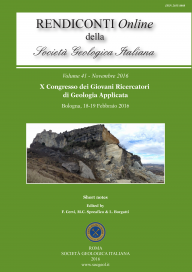
The debris flow of Rocchetta Valley (Umbria, central Italy). Preliminary results.
Andrea Fredduzzi (a), Corrado Cencetti (a) & Pierluigi De Rosa (a)
(a) Department of Physics and Geology, University of Perugia, Via Pascoli, s.n.c., 06123 Perugia, Italy. E-mail: andrea.fredduzzi@unipg.it
Volume: 41/2016
Pages: 155-158
Abstract
The paper describes the results of preliminary surveys and calculations carried out to study a debris flow occurred in the Rocchetta Valley (northeast Umbria, Italy) on November 11, 2013. This event is of particular interest because, although it can certainly be considered exceptional, is representative of conditions rather frequent in the Apennines. In this area the dynamics of ephemeral streams, present in narrow and steep valleys, was completely changed by human interventions and the risk conditions arising during extreme weather events are completely ignored. The collected data, result of bibliographic research, surveyed in the field and remotely sensed by a fixed-wing drone, indicate that the debris flow has developed about 1.8 km upstream of the town of Gualdo Tadino, at the confluence of a creek that originates from an important spring (Campitella) with the Feo Creek. The debris flow, after activating the old riverbed for about 1 km, settled at the end of the valley of the Feo Creek (in the outskirts of the town of Gualdo Tadino), about 6200 m3 of material, burying fully the establishment of the Rocchetta, well known in Italy for the production of mineral water.
Keywords
Get Full Text